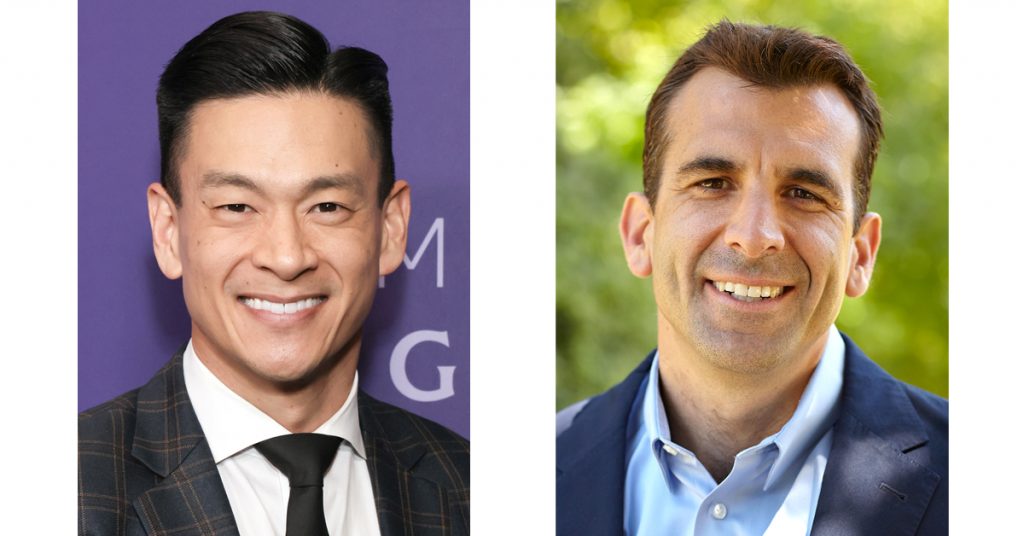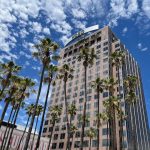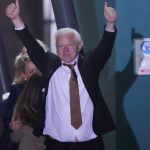Four months before Election Day, State Assemblymember Evan Low and former San Jose Mayor Sam Liccardo have raised a whopping $4.4 million in the contentious congressional race to replace U.S. Rep. Anna Eshoo, with one attracting significantly more campaign cash from the South Bay and Peninsula.
Liccardo, who topped the 16th Congressional District primary in March, has taken in $2.6 million. Low — who snagged the second spot after a riveting recount — has brought in $1.7 million. The former mayor, however, drew considerably more donations from Santa Clara and San Mateo counties — 67% compared to 41% for Low, according to a Bay Area News Group analysis of campaign finance data through March 31.
The congressional district covers a large swath of both counties and stretches from Pacifica in the north to San Jose and Los Gatos in the south.
So far, Low has raised more money from Los Angles County than from San Mateo County, with 75% of Low’s total contributions from California residents compared to 87% for Liccardo.
Michael Trujillo, a Southern California-based Democratic strategist, said it makes sense that Low, a Chinese American, is tapping into Los Angeles County since it “has a robust Asian donor population.”
“If you’re AAPI (Asian American and Pacific Islander) anywhere in the nation, but specifically in California, you’re always trying to increase the number of Asian American and Pacific Islanders who could potentially represent you in Congress,” Trujillo said.
Lindsey Cobia, a spokesperson for Low’s campaign said that “as the only non-incumbent Chinese American candidate for Congress in America and one of the few LGBTQ candidates, it’s not a surprise that Evan’s historic candidacy has generated a lot of grassroots support both outside and within the district — where he actually lives.”
In a statement, Liccardo’s campaign boasted about the amount of local support the former mayor has received.
“Our district deserves a leader who represents the people of this district, not the special interest corporations ripping them off,” campaign spokesperson Gil Rubinstein said. “Sam Liccardo is that leader. His integrity can’t be bought.”
Campaign finance reports indicate that Liccardo received a $1,000 donation from Chamath Palihapitiya in March — three months before the venture capitalist co-hosted a fundraiser in San Francisco that raised $12 million for former President Donald Trump’s campaign. Palihapitiya has historically been a major donor to the Democratic Party, shelling out $33,400 to a Super PAC backing Hillary Clinton in 2016 and $250,000 to one supporting President Joe Biden in 2020.
Liccardo’s campaign declined to address the donation.
Low has also received donations from local political powerbrokers. Soon after he announced his congressional bid last year, California Waste Solutions CEO David Duong gave his campaign $6,600. Last week, Duong’s home, as well as the homes of his son, Andy Duong, and Oakland Mayor Sheng Thao were raided by the FBI. The law enforcement agency has not said what the search was seeking, but in 2019, Oakland’s Public Ethics Commission opened an investigation into the Duongs’ use of “straw donors” — or third-party entities — to funnel money to City Council candidates. The Duongs’ have been major donors in Bay Area politics for years.
But Low’s campaign said that he has since donated the contribution to Ayudando Latinos A Soñar, a Half Moon Bay-based nonprofit.
“Upon learning of the recent reports, the Assemblymember donated the totality of the Duong family contributions to his Congressional campaign to a local nonprofit assisting with services and housing for farmworkers and their families,” Cobia said.
Other notable donors to Low include former presidential candidate and businessman Andrew Yang, Bobby Berk of “Queer Eye” fame and Netflix co-founder Reed Hastings. Notable donors to Liccardo’s campaign includes investors Tyler and Cameron Winklevoss, former New York City Mayor Michael Bloomberg and LinkedIn co-founder Reid Hoffman. San Francisco 49ers President Al Guido has also given to both campaigns.
Low, who defeated Santa Clara County Supervisor Joe Simitian in the runoff, has roughly 1,200 individual campaign contributions with an average donation of $1,161, while Liccardo has about 1,500 individual contributions that are slightly larger at $1,730 on average.
Trujillo said local elected officials, like Liccardo, are more likely to garner more individual donors than politicians in Sacramento who may have more funding from special interests.
“It makes sense that the former mayor would be able to build up individual donations in the district since he was the former mayor there,” he said. “It’s obvious that Evan’s having to look outside for donors, maybe they’re AAPI in Los Angles County or maybe they’re just normal large donors, but it makes sense that he would have to cultivate donors from a larger geographic area than the former mayor would.”
Related Articles
Sarah McBride poised to become the first transgender member of Congress
‘We are protesting both of them.’ Presidential debate draws activists’ ire
Trump has spent months painting Biden as incompetent. Now he’s changing his tone before the debate
Laugh (or cringe) at these history-making moments from presidential debates
This week’s televised debate is crucial for Biden and Trump — and for CNN as well
In California, candidates for state offices — like the assembly seat Low currently holds — are barred from accepting campaign contributions from registered lobbyists in an effort to prevent corruption. But because the law doesn’t prevent state officeholders from taking donations from lobbyists while running for federal office, many California lawmakers have done so as they seek a higher post.
Campaign finance reports show that Low has received $30,700 from registered lobbyists in his quest for Congress. The 24 lobbyists represent a wide range of companies like General Motors, the California Chamber of Commerce, Lyft and PG&E.
Low’s campaign did not respond to a request for comment on him taking lobbyist donations.
Liccardo has also taken money — $1,750 in donations — from state lobbyists, as well as from local lobbyists that he worked with during his time as mayor. San Jose has no policy preventing lobbyists from donating to council or mayoral candidates.
Melissa Michelson, a political science professor at Menlo College, said the situation isn’t black and white and that it’s a consequence of the United States’ inability to take money out of politics.
“While it’s true that some candidates won’t take money from lobbyists, even when they can due to moral reasons, that doesn’t mean that accepting those kinds of contributions is immoral or unethical,” she said. “I think the whole point of the disclosure laws is so that the public can decide if that sort of behavior is something they want from their elected officials or not.”


